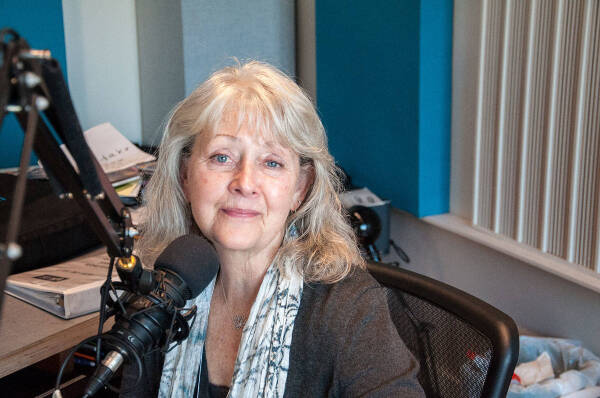It’s a lovely spring day in central Illinois.
The sky is bright blue with wispy white clouds at my feet. The corn fields are below my head as I soar upside down several hundred feet above in an open cockpit biplane of undetermined vintage.
Pretty soon the plane does a rotating nosedive, and I am giddy! I’m broadcasting the plane’s aerobatic maneuvers live, on the local radio station, for which I am the newsroom and the promotions department.
I’m feeling lucky because this is the second time that day that I get to do this … the air show broadcast team had to test my ability to maintain my composure under these circumstances. The first time I went up with the pilot (leather helmet and all), I admit I swooned when the gap in my shoulder straps let me drop a half-inch upside down.
“Well, this is a great way to go,” I thought — wondering how my kids would feel when they heard about their mom being splattered across a cornfield. No worries. This was Radio News the way I loved it – live, in person, on the scene and scooped!
I first thought about radio in my teens when somebody told me I had a “great voice” for it.
I hadn’t yet discovered the women of NPR. At that time, it was a baritone man’s voice that dominated the airwaves, so I shrugged it off. And I didn’t think much more about it until years later, when I was studying journalism in college as a single-parent student.
One afternoon, as I was writing my contributions to our campus nightly TV newscast, my crotchety television advisor keeled over with a heart attack. As the oldest student on the news crew, I was appointed to the paid job of producer/director for the nightly news. How could I say no? I was supporting my two kids and myself on these work-study gigs, loans and grants.
The combination of lightning scripts, ego-driven boy anchors and the pressure of directing made TV news less than fun.
But I loved chasing and reporting on “the story,” and radio made it simpler. So, my first job after graduation was this news post with the town’s smaller of two local stations. It was there that I learned how sound, on its own, makes radio a most creative medium. I was free to pull in a “wild” sound that brought the listener into a scene. I learned the impact of music as a backdrop or an emphasis. And I loved the adrenaline rush of being the first on the scene of a fire.
Soon I was living on adrenaline, working weekdays from 4 a.m. to 10 p.m. I had to hire a third kid to care for my two young sons. Without the student rent subsidy and food stamps, my $6,000 annual salary didn’t cover all that.
When I told my boss I’d have to quit, he said (in his deep baritone voice), “Tiger, folks expect to hear you on the news every day. I’ll give you a raise.”
Great! That moved me up to $9,000 a year, and I brought my kids to the studio on Sundays when I hosted my weekend variety show. They were my favorite interview subjects — Star Wars experts.
I sustained that pace, delivering six newscasts five days a week, covering night meetings, and creating ads for local businesses for as long as I could. My passion for radio and for journalism grew with my local reputation for scooping the ABC affiliate.
At first, their news people attacked my personal life, accusing me of sleeping my way into hot sources. Then they offered me a talk show. But, in the first of many career errors, I turned them down, insisting I was “a serious journalist” and couldn’t be bothered to take a silly talk show job. That was about the time Oprah, Phil Donahue and David Letterman were getting off the ground …
My kids and I couldn’t last long on that skinny salary and the fat demands of small-market radio, so I had to quit and go to “the dark side” – public relations. It was heartbreaking to give up my first love, but to keep it close, I volunteered with a university NPR station, creating radio theatre while I climbed the PR and marketing ladder with ever bigger jobs in Normal, Illinois. No kidding — the town’s name was Normal, home of Illinois State University and the local NPR affiliate. I was grateful they allowed me to continue using sound in the theatre of the imagination.
Eventually, I moved back to Chicago for bigger corporate jobs in all kinds of communication, and I always included radio and TV production in my tool kit.
When I finally left the corporate world to move to a small island in Puget Sound, I unearthed other radio refugees – some still active professionals – and they invited me to join them in creating a small but mighty Internet radio station, the Voice of Vashon.
That web station survived 13 years to become an independent community FM radio and TV station. And those radio refugees became some of my best friends.
With these talented radio reprobates, I have been allowed — even encouraged — to wallow to my heart’s content in all kinds of radio, from news to theatre to music, game shows and yes, even a talk show.
With these people, I have been able to sustain and nurture my love affair with radio and I don’t see it ending any time soon. More importantly, we are keeping alive a rare animal in the American media jungle – truly independent community broadcasting — a surviving dinosaur of democracy.
Listen to the Voice of Vashon at KVSH 101.9FM, or voiceofvashon.org.
Susan McCabe lives and writes on Vashon. She publishes her essays on Substack under the title, “Hot Flashes Cold Showers.” Subscriptions are free at susanhmccabe.substack.



